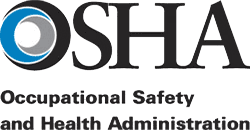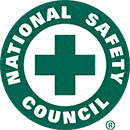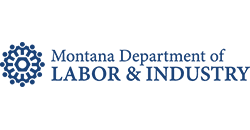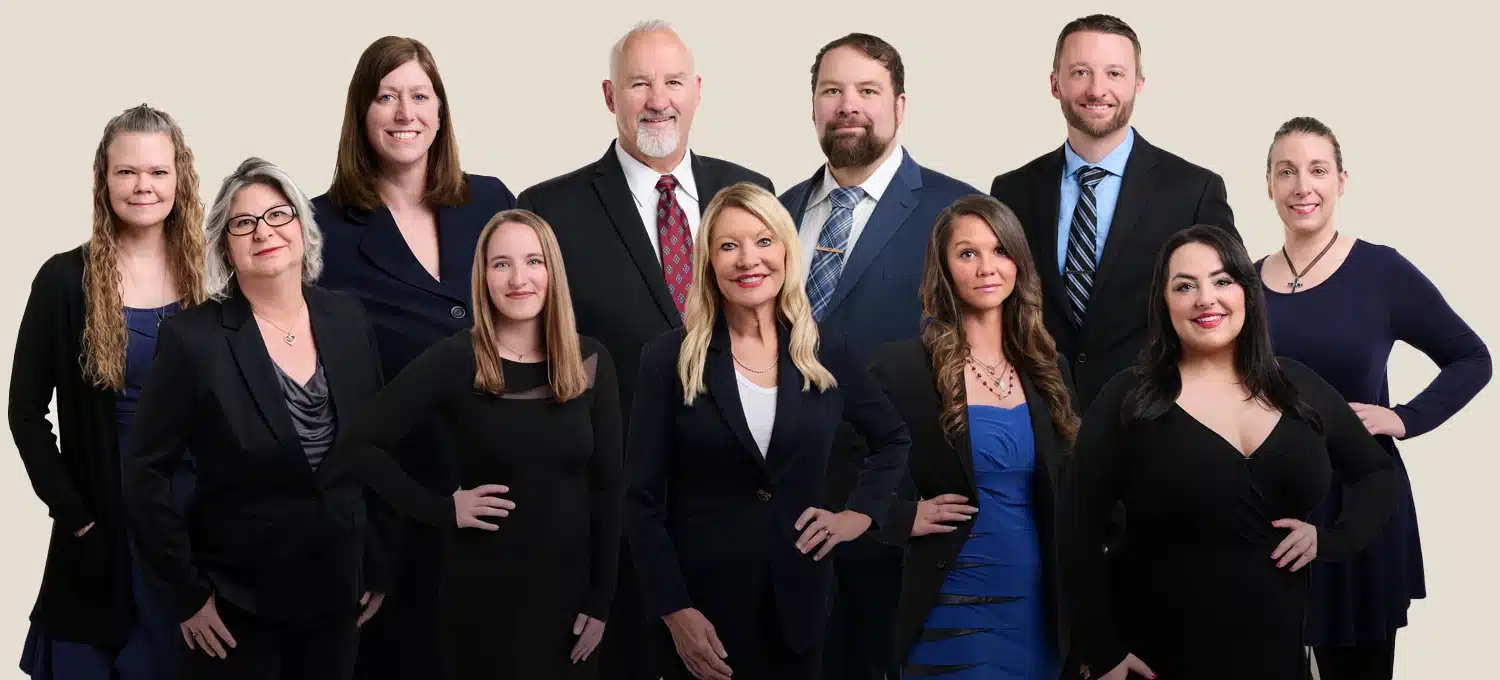Injured at work?
Get answers to commonly asked questions about workers’ compensation.
When you’ve been injured on the job, you deserve justice and compensation. But how do you make sure you actually get it?
Montana’s workers’ compensation system can be complex and confusing, especially if it’s your first time filing a work injury claim. If you have questions about your workers’ compensation benefits, review the list of frequently asked questions below. Then, schedule your free consultation in Great Falls, MT to learn more about your specific case. Each workers’ compensation case is unique, so a face-to-face consultation with an experienced attorney near you is the only way to get real answers.
If you’ve been injured on the job in Montana, get help from Murphy Law Firm. Attorneys Thomas J. Murphy, Charla K. Padlock, Matthew J. Murphy and Thomas M. Murphy offer personalized and top notch representation in Montana. Since we only represent injured people, you can count on superior service in your time of need. Our attorneys advocate for injured workers’ rights (beginning with the legislative process) and we have the knowledge and determination needed to protect your rights as an injured employee. You can depend on us to pursue full legal redress as we press for justice in your case.
What is workers’ compensation insurance?
Workers’ compensation is a no-fault insurance program. Not only must employers in Montana have workers’ compensation insurance, it becomes an employee’s “exclusive remedy” in the event they are injured on the job.
Workers’ compensation provides 2 main benefits:
- It gives injured employees a guaranteed source of compensation for their injuries (regardless of who was responsible).
- It gives employers immunity from personal injury lawsuits for most workplace injuries.
Of course, workers’ compensation isn’t just beneficial, it’s mandatory. Failure to have it is typically a misdemeanor with a fine. State law requires most employers to have workers’ compensation. Federal workers’ compensation laws apply to a few special industries.
These state and federal laws set out the coverage, benefits and procedures for making claims. An employer has 3 options when it comes to obtaining insurance. These include purchasing it from a state run insurance pool, from a private insurance carrier or self-insuring.
What benefits are provided by workers’ compensation?
Workers’ compensation insurance typically covers the following costs associated with a workplace injury:
- Medical treatment
- Disability payments (temporary or permanent, partial or total)
- Lost wages
- Death benefits (to the deceased employee’s surviving dependents)
Notably missing from this list of benefits is compensation for pain and suffering as this is not covered by workers’ compensation.
Who can file a workers’ compensation claim?
Typical workers’ compensation laws only allow injured employees to file claims stemming from work-related injuries or illnesses. Spouses and dependents aren’t allowed to file loss of consortium or loss of services claims for a work-related injury if their loved one is still living.
In the case of a workplace fatality, however, spouses or other dependents may seek death benefits and burial expenses under the Montana workers’ compensation system.
What do I have to do after my job injury?
Report any on-the-job injury or occupational disease to your supervisor, insurer or employer as soon as possible. You must give notice within 30 days after the occurrence of the accident (or 1 year from the date you knew or should have known about your occupational disease.) This notice must include the time and place where the accident occurred and the nature of the injury. We recommend you report minor injuries to your employer whether or not you receive medical treatment.
You must submit a written and signed First Report of Injury (FROI) document within 12 months from the date of the accident or occupational disease. You can submit this form to your employer, the workers’ compensation insurer or the Montana Department of Labor and Industry.
Upon receipt of your signed FROI, the insurer has 30 days to accept or deny your claim.
Should I seek medical treatment if I’m hurt on the job?
If you’re injured at work, you should seek immediate medical attention. Initially, you have the right to choose the treating physician. But be careful about who you see initially, because that doctor will become the official treating physician (if he or she is willing).
What if the insurance company has denied my claim for workers’ compensation?
If the insurance company denied or rejected your claim, you have the right to file a timely appeal. At this point, you should definitely consider consulting an experienced workers’ compensation attorney if you haven’t already, as the appeals process is complicated and confusing.
What steps should I take when my workers’ comp claim is denied?
First, find out what the reason is for the denial. The letter denying your claim will be your best initial source of information. Sometimes denials happen for reasons that can be explained or resolved without going through the extensive legal process that appeals typically entail. For example, maybe you simply didn’t complete a form correctly—or perhaps the insurer didn’t have enough information, so they denied your claim.
Sometimes, however, insurers issue denials for more than simple technicalities or lack of information. In those cases, you need to consult an experienced workers’ compensation attorneys to discuss your claim. Murphy Law Firm offers a free initial consultation to discuss your claim and help you decide how to proceed. Consult Murphy Law Firm quickly after your claim is denied.
| Workers’ Compensation Timeline | ||
|---|---|---|
| Who? | What? | When? |
| Worker | Report – The employee reports an injury or illness to their employer | Reported verbally within 30 days of the accident with a written report within 1 year of any injury or occupational disease |
| Worker/Employer | Submit – The employer submits a completed First Report of Injury (FROI) form | Within 6 days after being notified about an injury or occupational disease |
| Employer | File – The employer files claim with their workers’ comp insurance company | Within 12 months (1 year) from the date of the accident |
| Insurer | Ruling – The insurer either accepts or denies the workers’ compensation claim | Within 30 days of the claim being filed |
| Worker | Appeal – If benefits are denied or terminated before an employee is ready to return to work, the worker may appeal | Within 2 years of termination or denial |
What is an occupational disease?
If your injuries or symptoms occur over more than one work shift, you have suffered an occupational disease. To file a claim for an occupational disease, you must notify your employer and submit the necessary paperwork within 1 year from the date you knew or should have known that your condition resulted from an occupational disease.
What’s considered a job-related injury?
Your injury must arise in the course and scope of your employment to be compensable under the Workers’ Compensation Act. This doesn’t mean that the injury must have occurred at your normal place of work. The essential test of whether your injury will be covered is whether it’s job-related and whether it was required or essential for your job.
How common are work-related accidents and diseases?
According to the Bureau of Labor Statistics, there were nearly 3 million on-the-job injuries in 2012, or 3.4 per 100 workers. Every 7 seconds, a worker is injured on the job. Another 5,147 workers while working in 2017.
Transportation incidents are typically the leading cause of workplace injuries, accounting for 2 of every 4 work fatalities in 2012 based on data from the National Safety Council. Logging was America’s most deadly job in 2012 at 127.8 deaths per 100,000 workers, compared to 3.2 per 100,000 workers for all occupations.
What are some resources for workplace safety and accident prevention?
Your best resource following a workplace injury or illness will be an experienced Montana workers’ compensation attorney who can explain your legal rights and discuss next steps. For additional information about filing a workers’ compensation claim or reporting unsafe working conditions, consider checking out the following resources:

Occupational Safety and Health Administration (OSHA)
The federal agency of the United States Department of Labor tasked with ensuring safe and healthful working conditions for working men and women by setting and enforcing standards and by providing training, outreach, education and assistance.

The nation’s leading nonprofit safety organization advocating for the elimination of eliminating preventable deaths and injuries at work, in homes and communities, and on the road through leadership, research, education and advocacy.

Montana Department of
Labor & Industry
The Employment Relations Division provides a wide variety of services and regulation related to the employer – employee relationship in the state of Montana, including issues involving workers’ compensation coverage and claims, human rights claims, workplace safety and health, wage and hour claims, prevailing wage claims, and public sector collective bargaining.
Montana Workers’
Compensation Court
The Montana Workers’ Compensation Court offers info on department organization, media releases, worker information, employer information, job seeker information, hearings information, resource center, public comment, laws, rules.
Workers’ compensation resources
Get answers to commonly asked work injury questions like what is workers’ comp insurance, who can file, what to do, what is an occupational disease, statistics and more.
Workers’ compensation
claims process
Learn about the steps to file a work injury claim in Montana, including which forms you need to fill out, the deadline to report a workplace injury, and how to appeal a denied claim.
Types of
work-related injuries
Many different types of catastrophic injuries can result from an on-the-job accident, such as traumatic brain injury, burn injuries, loss of limb, or vision loss. A fatality is the worst case scenario.
Employers are required to ensure a safe workspace for their employees. But some types of professions are inherently unsafe, especially in an industrial town like Great Falls, MT.
“Thank you for everything you did for us. You have very great and compassionate attorneys and staff. We would have been lost without your firm.”
Schedule Your FREE Consultation With Our Work Injury Lawyers
Murphy Law attorneys have had exceptional success assisting clients with appeals and providing legal representation in court. We consistently rank among the highest grossing workers’ comp attorneys in Montana, which means we win the most financial compensation for our clients.
At Murphy Law, we help deserving clients to achieve maximum medical improvement (MMI) status, allowing continuation of benefits for as long as possible.
Many past clients who were initially denied benefits now have lifelong income for permanently disabling conditions.
We may be able to help you obtain reimbursement and compensation for:
- Medical bills
- Lost wages
- Travel expenses
- Loss of consortium (income, companionship, child care, etc.)
- Emotional distress (pain and suffering)
- Punitive damages (money given as punishment)




